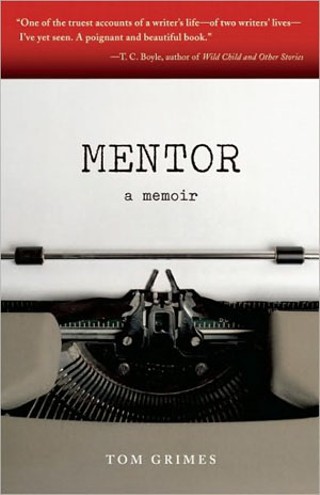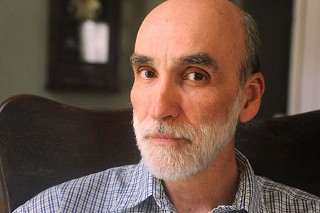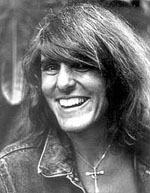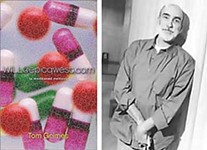A Change in Perspective
Tom Grimes doesn't rewrite history in his memoir, 'Mentor' – he just understands it a little better now
By Kimberley Jones, Fri., Aug. 27, 2010
Tom Grimes wasn't having a great morning. On summer break from his job running Texas State University's well-regarded creative writing program, he'd returned home from travels to find his Internet down. Then he set the alarm off at the Katherine Anne Porter house, the historic home Grimes led the effort to preserve, and had to spend the first 10 minutes of our interview explaining the situation to two uniformed officers from the Kyle Police Department. Moments after I turned my recorder on, a guitar inexplicably crashed to the floor. Altogether a chaotic scene, in marked contrast to the calm – even serenity –he has achieved with the publication of his memoir, Mentor (Tin House).
Grimes was a thirtysomething struggling writer waiting tables in Key West when he was accepted to the Iowa Writers' Workshop at the University of Iowa, long the undisputed king of creative writing programs (Kurt Vonnegut, John Cheever, and Philip Roth all taught there, and Raymond Carver, John Irving, T.C. Boyle, and Joy Williams studied there). At Iowa, Grimes was taken under the wing of the workshop's director, Frank Conroy, a titanic figure both then, for his much-praised memoir Stop-Time, and later, as nurturer to some of the best American writers working today. Conroy took an especial liking to Grimes, comparing his writing to Don DeLillo's, and was convinced that Grimes' second novel, Season's End, which he completed at the workshop, would rocket his protégé to success. All signs pointed to yes –a bidding war, the comparison to DeLillo bandied about– but through a mix of happenstance, bad luck, and rushed decision-making, all of which Grimes details in Mentor, Season's End crashed and burned upon its release in 1996. Grimes defined himself by that book's failure, and he spent the next two decades grappling with severe depression and bouts of intense paranoia.
But the other constant was Conroy, with whom he had formed a profound connection. "I arrived fatherless," Grimes writes of his time at the workshop. "I departed a son." A few years after Conroy's death in 2005, Grimes set down to write a book about Conroy and his body of work, but what emerged was a portrait of both men –mentor and protégé first, then lifelong friends.
Austin Chronicle: The book charts the evolution of your relationship with Frank very explicitly: First he's an idol, and then he's a teacher, and then he's a friend, and then a father figure, and then, you know, he's more or less an equal. Had you processed those stages before you started writing, or did you find it as you went along?
Tom Grimes: I found it as I wrote. ... I didn't know what was coming, and I didn't even really know when it was done. ... I sent it to Charlie – [fellow Iowa grad] Charles D'Ambrosio – and he read it and he said, "Well, okay, it's not Frank's story; it's your story." ... So at that point I realized: "Huh. I guess I wrote a memoir, and I guess I'm in it more than I realized."
AC: Was that a problematic realization for you?
TG: No. It's probably better that it went like that, because if I didn't have Frank as a lens, I don't think I could have looked at myself as honestly as I did. ... I think that if I had, you know, just set out to write the book consciously, I probably wouldn't have finished it; it probably would have seemed really self-indulgent. I never really entertained the idea of writing a memoir. And I may have felt too self-conscious about it, and some of the things that I admit in the book would have seemed coy maybe. But because I actually just discovered them when I wrote the sentence, then I don't think they come across that way.
AC: For example?
TG: Oh, the fact that for 20 years I misunderstood my life. That, you know, I tormented myself over the failure of this novel, my second one, Season's End. And that I didn't realize all that time that my friendship with Frank was really the more important thing that came out of that whole experience. ... That became the more important thing in my life and the more sustaining thing in my life for another 15 or 16 years. And only when I realized it, only when I wrote [Mentor] did I realize like, "Oh my God, I've wasted 20 years of my life thinking about [the failure of Season's End]." And now that I've finished the book, it's a cliché, but, you know, a lot of demons have been buried and doors have been closed, and I don't feel like a failure anymore.
AC: Wow.
TG: Yeah. That was unexpected.
AC: Yeah. Nice little bonus.

TG: Yeah. It's funny that, you know, the subject I know the most about was failure, so that's what I wrote about. [laughs] It would be perfectly ironic that the book that is my biggest success is the book about failure.
AC: You lay yourself pretty bare in this book – the self-doubt, the despair, various psychiatric diagnoses. In the course of writing, did you ever think, "Whoa, my colleagues are gonna read this"?
TG: No. I didn't care. I don't consider Mentor tawdry at all. Though, you know, since the book's out I haven't been back to the school yet. [laughs] I don't know what kind of looks I'm gonna get. ...
I didn't think of it as like, "Here's my pain," you know? There were these terrible periods that I went through, but what leavened it was my friendship with Frank and the great stuff that we went through together. It kind of balanced the scales. ... The only person that I asked permission from to write about was my sister, because I wrote about my sister's attempted suicide. ... She said: "It's so long ago. Go ahead, say what you want; I'm gonna write my own memoir anyway. I'll correct what you said."
AC: You've got a pretty tight scope to the book, and obviously there were a lot of things that couldn't get in there. But I was curious, it's a book about your relationship with your mentor but it doesn't talk about your own relationship as a teacher with your students.
TG: I tell my students all the time that every story has a clock, and it starts ticking when dramatic action happens. That starts [in Mentor] when I meet Frank. And the dramatic action ends when the dramatic action ends, regardless of what it is. The clock's out of time, so you can't add overtime to the book. ...
But I guess I would have seemed like, really, I don't know, narcissistic or something like that, you know? The young writers that I've worked with over the years, some have been successful, and if I've helped them a little bit, that's great, but the success was ultimately their own. I don't think it's a teacher's right to take a lot of credit for their students' success, you know? Frank was happy for my success – he didn't take credit for it. ...
But it was pretty funny – there's a review online, through Goodreads, I think it is, where just like regular readers can [submit reviews]. And this one woman wrote, "This is the most honest book I've ever read, so now I want Grimes to write about everything – his wife, his family, his kids, the whole nine yards." [laughs] "I want everything."
AC: How does your wife feel about that idea?
TG: Uh, probably not great. ... I don't think I'll ever write another memoir. Right now I have nothing in my head at all to write. I have no desire to write whatsoever – none, zero. I have to talk to a couple of editors about doing some magazine work maybe, but for a book, I don't have a thing in mind. You know, maybe when this stuff, like, goes away, dies down, maybe my mind will start up again.
AC: Is that alarming to you? To not have anything cooking?
TG: Doesn't bother me at all. Every writer has one book, like, the key book that that person has to write before they die. I think I wrote mine.
The Texas Book Festival will host a book launch party at the Barnes & Noble Arboretum (10000 Research) on Friday, Aug. 27, at 7pm. Proceeds will benefit the Texas Book Festival.
Texas State University will also host a reading and booksigning at the Wittliff Collections in San Marcos on Wednesday, Sept. 15, at 3:30pm.











